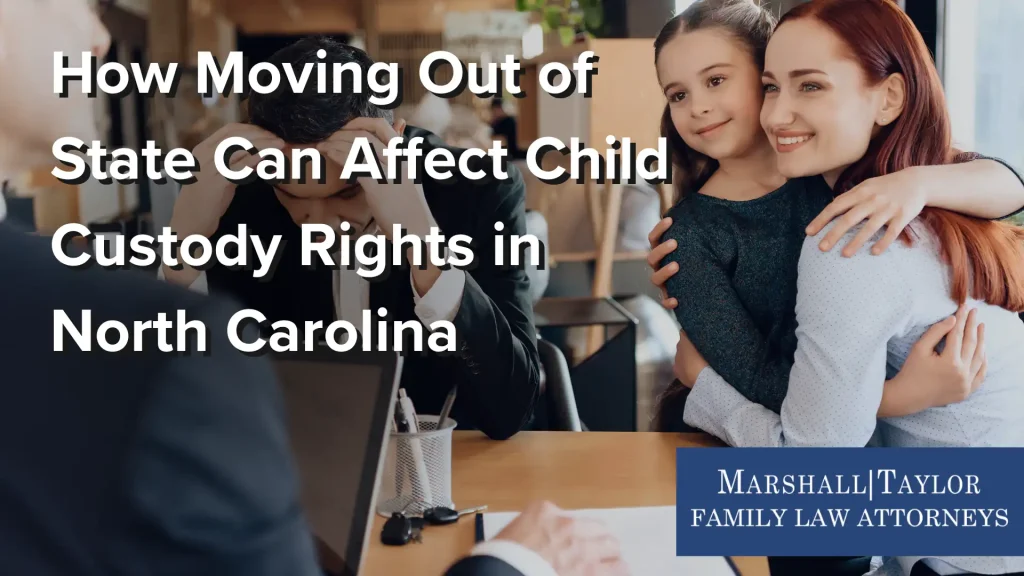
Whether you are in the middle of a child custody dispute and need to relocate or you already have a child custody order that will be affected by a move, you need to be informed of the effects that relocation will have on child custody decisions.
When deciding custody issues, North Carolina law uses a “best interest of the child” standard. Even after a decision has been made, a child custody order could be modified if the best interests of the child are no longer reflected in the child custody order.
Before making a decision about an out-of-state move, consider these factors that might affect your child custody decision:
- Effects of relocation for the child: Because the court is primarily concerned with the best interests of the child, it will always consider how the relocation might affect the child. If, for example, the child is at an age where it would be more detrimental to start over at a different school in a different place, that could negatively affect your chances at keeping or gaining primary/physical custody of the child. If a child will be positively affected, such as if the parent will have a more stable job in the new place allowing them to spend more time with their child, this would make the move more favorable to the child and their interest.
- Reason for the move: Sometimes, a recently divorced individual will want to move out of state as a therapeutic change of scenery to get away from the memories associated with their ex-spouse. Another reason for relocation could be a new job or a new partner. The reason for your move will affect the judge’s decision. If the move is for the greater interest of the child, then it will not negatively affect the decision. But if the decision to move is a spur of the moment impulse, this may negatively affect your custody battle.
- Likelihood that the custodial parent will comply with visitation orders when they are no longer in the state of North Carolina: Abiding by visitation agreements is important, both for the parents and the well-being of the child. The judge will inquire into the character of the custodial parent to determine if they will comply with visitation orders after relocation. If the judge determines that the move will make it unlikely that the child will see the non-custodial parent, they will make changes to the custody order to make sure the visitation agreement is followed.
- Reason for disputing the relocation: Sometimes, one parent will attempt to relocate in order to prevent the other parent from having contact with the child. If the other parent is genuinely opposed to the relocation because of possible negative motives on the part of the moving party, then custody might change. If relocation will negatively affect the child’s relationship with the other parent without having increasingly positive effects on the child’s life, then the parent relocating probably will not gain/keep primary or physical custody.
- Whether or not a reasonably realistic visitation schedule could be arranged with the other parent: Often, custody orders dictate that the child spends one weekend with one parent and the next with the other. This is often not possible when parents live across the country from each other. If a judge knows that visitation or joint custody will not be possible, he or she might make changes to the custody order due to relocation.
Even if you have primary or sole custody of your child, there can be modifications made by the judge if the previous decision is no longer in the best interest of the child. The court will either permit relocation and adjust the visitation schedule accordingly, or modify the custody order, naming the other parent as primary custodian.
Relocation can greatly affect your custody rights. When possible, you should show plenty of evidence proving that the relocation would be in the best interest of the child. You should show how the move will benefit the child, and the benefits should outweigh the cost of relocating. Before making a decision to relocate, consider all of the factors that the court will look at in making a custody decision. Make sure that it is in the best interest of your child to relocate. In cases where the child is mature enough to have some say as to where they go, it may also negatively impact your custody rights if the child does not want to move out of state.
These decisions are made on a case-by-case basis and you can never be sure how relocation will affect your custody rights, but you can evaluate the factors above to get an idea of how the court will make its evaluation. Always remember to keep your child’s best interest in mind, because that is ultimately how the court will decide.
If you are considering moving out of state but are worried about how this will affect your custody arrangement, contact a lawyer from Marshall & Taylor PLLC for help. Our Raleigh child custody attorneys can look into your situation and help ensure that you keep or gain custody of your child. To discuss your case, call us today at (919) 833-1040.
